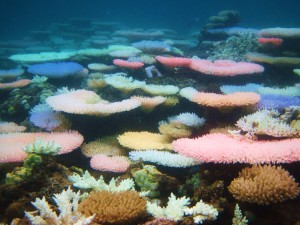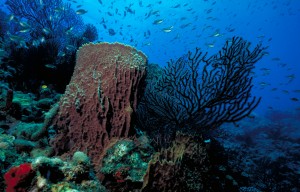More than 2,600 scientists are calling on governments worldwide to take steps to protect valuable coral reef ecosystems.
They’ve endorsed a statement written by scientists brought together by the Center for Ocean Solutions at California’s Stanford University.
The statement was released this week to kick off the 12th International Coral Reef Symposium being held in Cairns, Australia.
“Rising sea levels, more intense storms, changes in ocean chemistry due to air and water pollution – all these stress coral reefs,” said Steve Palumbi, an expert on corals with the Center for Ocean Solutions and the chief organizer in developing the consensus statement. “At least 25 percent of the world’s coral reefs have been degraded. Because of the global origin of climate change, the only way to tackle this is through a worldwide effort.”
The statement calls on governments to take action through global initiatives to reduce emissions of carbon dioxide and other greenhouse gases, and to increase local protection of coral reefs throughout the world.

A rare moment during the process of coral bleaching. When corals are stressed by various changes in their conditions they blow out the symbiotic algae that live in their tissues, causing them to turn completely white(Photo: Ryan Goehrung/Marine Photobank)
The scientists referred to the world’s coral reefs as important ecosystems which, despite being ecologically, economically and culturally valuable, are in decline everywhere due to human-based factors such as pollution, sedimentation, overfishing and climate change, all of which, they say, are expected to rise in severity.
The statement lists changes scientists have already been observed over the last century:
- Approximately 25-30% of the world’s coral reefs are already severely degraded by local impacts from land and by over-harvesting.
- The surface of the world’s tropical oceans has warmed by 0.8°C, resulting in unprecedented coral bleaching and mortality events.
- The acidity of the ocean’s surface has increased due to increased atmospheric CO2.
- Sea-level has risen on average by 18cm.
Unless action is taken now, future impacts on coral reefs could include:
- Most corals will face water temperatures above their current tolerance.
- Most reefs will experience higher acidification, impairing calcification of corals and reef growth.
- Rising sea levels will be accompanied by disruption of human communities, increased sedimentation impacts and increased levels of wave damage.
- Together, this combination of climate-related stressors represents an unprecedented challenge for the future of coral reefs and to the services they provide to people.
The International Coral Reef Symposium, which runs through July 13, is held once every four years. Organizers say this year’s symposium will draw more than 2,000 scientists from 80 countries. They’re expected to present cutting-edge science and to share the latest advances in coral reef conservation.






















MAKE GREEN OUR LAND and CARE BLUE MY OCEAN have sinergies mottos to care our planet i think closed relation when our forests with good management is good to reduce green house effect, and global warning to make coral healthy and good feeding for plankton and our fish. it is make good economic for peoples in mainland and fishermen also outdoors and marine tourism.